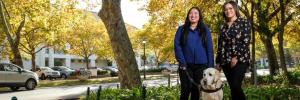
Don’t distract the dog … and other lessons from Lead with Disability
Did you know that when you meet someone who is blind, you should resist the urge to engage with their service dog? While it may be a natural reaction to want to pet the animal, the dog is actually working and unless its owner gives you permission, it's not a good idea to distract it.
This is just one of many tips on how to interact with people with disabilities that Stellenbosch University (SU) staff and students can master in the popular Lead with Disability course that starts on 2 August.
The six weekly sessions of the free course presented by Lizelle Apollis and Luigia Nicholas of SU's Disability Unit will run until early September.
Nicholas has ample experience in sensitising people to the needs of the disabled community. Her own journey has been one of adaptation and perseverance. Affected from a young age by Stargardt disease and Fuchs uveitis syndrome, her eyesight gradually diminished over time. But rather than letting her disability define her, Nicholas has embraced challenges and found ways to excel in her dedication to empower others. She completed a BCom Marketing degree at SU and focused on disability and rehabilitation studies in her postgraduate studies.
On campus she's always accompanied by her beloved dog Haiku, a steadfast companion who helps Nicholas navigate the outside world. The first time she took Haiku shopping was difficult, but it also led to a revelation, Nicholas says. “It felt as if the entire store was staring at me, which made me feel insecure and discouraged me from going to the store again. I was forced to decide – either feel sorry for myself and accept life as it is or fight to make a difference.
“After coming to SU, I began interacting with other differently‑abled students. That gave me a sense of belonging and I soon realised that I was not the only person struggling with issues of acceptance in a society that did not adapt to my needs.
“My own disability as a visually impaired person and as a former student leader at SU helps me bring in personal experience when connecting with students. It gives me a better understanding of what they're going through. It also makes it easier for me to advocate for student inclusion with staff members because I have experience of what it feels like to be excluded and can explain how it would make someone feel and why it is important to be inclusive," Nicholas explains.
The Lead with Disability programme was developed by Apollis in 2018. Since then, Nicholas has assisted in ensuring the content is relevant to the needs of students on campus.
When discussing the etiquette of dealing with people with disabilities, Nicholas is informed, compassionate and patient, but also frank about the dos and don'ts: Always ask before jumping in to help a disabled person. Avoid showing pity or being patronising. Speak directly to the person. Do not touch a person's mobility equipment.
“The golden rule is that disabled people need the same respect as anybody else," Nicholas says. “Do not assume that a person with an apparent disability needs assistance; offering assistance in broad terms such as 'let me know if you need anything' opens the door without assumptions of inability."
The purpose of the Lead with Disability programme is to raise awareness around disability-related matters and to give participants the tools to create an inclusive space for people with disabilities.
“The programme is aimed at students who want to make a difference by creating an inclusive and transformative space not just for people with disabilities, but for all. We encourage students to take what they have learned in the course and implement it in their environments or in their careers." Traditionally, spaces such as lecture rooms were not designed with the needs of people with disabilities in mind. People with disabilities who want to utilise services on campus often experience barriers in relation to access to spaces, equipment, transportation as well as obstacles in communication.
“For example, if a participant in the course is studying engineering, they will have a better understanding of how to make buildings accessible for someone in a wheelchair and why it is important to follow specific measurements so that when it's implemented, accessibility is easy."
Nicholas emphasises that the course is not only aimed at people with physical disabilities. “There are a substantial number of students and staff who have some kind of an impairment. Beyond physical disabilities, persons with disabilities include those who have long-term mental, intellectual or sensory impairments which, in the presence of various barriers, may hinder their full and effective participation in society on an equal basis with others."
The Lead with Disability course encourages participants to think about the way disability is portrayed in the media and popular culture and how and why stigmas persist. Nicholas says everyone with a disability has a different journey, but collectively we can all do more to make life easier for those with disabilities. “The inclusion of people with disabilities is not only the responsibility of the Disability Unit. It is the responsibility of the entire University community."
- Registration for the second semester Lead with Disability course closes on 30 July. Contact Nicholas ([email protected] / [email protected]) for more information.
- Online registration link: https://forms.office.com/Pages/ResponsePage.aspx?id=Azv6pjwKWEKEM6Eg3_zTSMJD9QD5pQ1DknGXsu2EkplUOTAzVlRGOEMyQ1hXQTJKREIwWEJOVVNYRS4u
PHOTO: Course presenters Luigia Nicholas, Lizelle Apollis and Haiku. (Photo by Stefan Els.)
